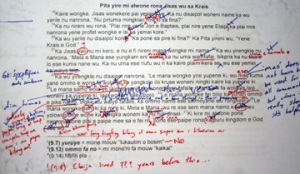From my journal on 24 July during advisor checking of Onnele translations in Papua New Guinea…
Chapter 12 has gone pretty slow. There were some pretty major things that needed fixing. For example, in Luke 12:48b… “From everyone who has been given much, much will be demanded; and from the one who has been entrusted with much, much more will be asked.” This is in the context of a section about faithful servants, but of course, each Onnele translation made this verse sound like a truism regarding the custom of payback (if people give to
you, you’ll have to give back to them). This applies to gifts, but revenge is also the law of the land. It took a while for the translators to even understand what the difference was, and even then, after they understood it,
they still wanted to translate it almost exactly like they originally had it.
At first, it said (in Onnele, Tok Pisin back translation, and English backtranslation, respectively)…
Nu uma empo nu’pu ompla mingkla, nu ese nane kore ompla mingkla paiyi kore. La mana wongke uma mingklari nane wu ompla mingkla, mana namo nu ese naline wu fa wu ese yali kore ompla mingkla.
Ol man i kisim ol planti samting, ol bai givim bek ol samting planti igo bek. Sapos wanpela man, ol man planti i givim em planti samting, dispela man ol bai askim em long em bai givim ol samting planti bek.
People who receive many things, they will give back many things. If a man–many people have given him many things–this man, they will ask him that he will give many things back.
Now we have something like this:
Nu uma e nu’pu ommo mingklari e bosni, bos ese yali mi kero fa nurune ommo mingklari woneni. Ne mana fina, bos ya’ne ira uporo mingklari, mana namo nu ese nunarine wu mi mimgkla.
Ol manmeri i kisim ol planti samting bilong bos, bos bai givim tok strong bilong lukautim ol planti samting bilong en. Na husat man, bos i givim planti gutpela het, dispela man ol bai askim em long planti tok.
People who receive many things belonging to [their] boss, the boss will give strong talk for him to look after the many things belonging to him. And whatever man, the boss has given [him] much good head [= much knowledge], this man people will ask him about much talk.
This translation makes some things very explicit that are not in the original:
- the identity of the master as the one who gives the work of ‘lukautim’ (looking after, or caring for) as the type of thing that is given (in the first case)
- knowledge as the type of thing that is given (in the second case)
Even though these things are not explicitly expressed in the original, I feel pretty confident that these are the implied meanings that fit within
this context. And if we didn’t put these things in, the translation would definitely mean the wrong thing–something about reciprocal giving of goods that really has nothing to do with faithful stewardship to an authority.
So even though things are going slow, I’m really happy with the kinds of changes that we’re making.

